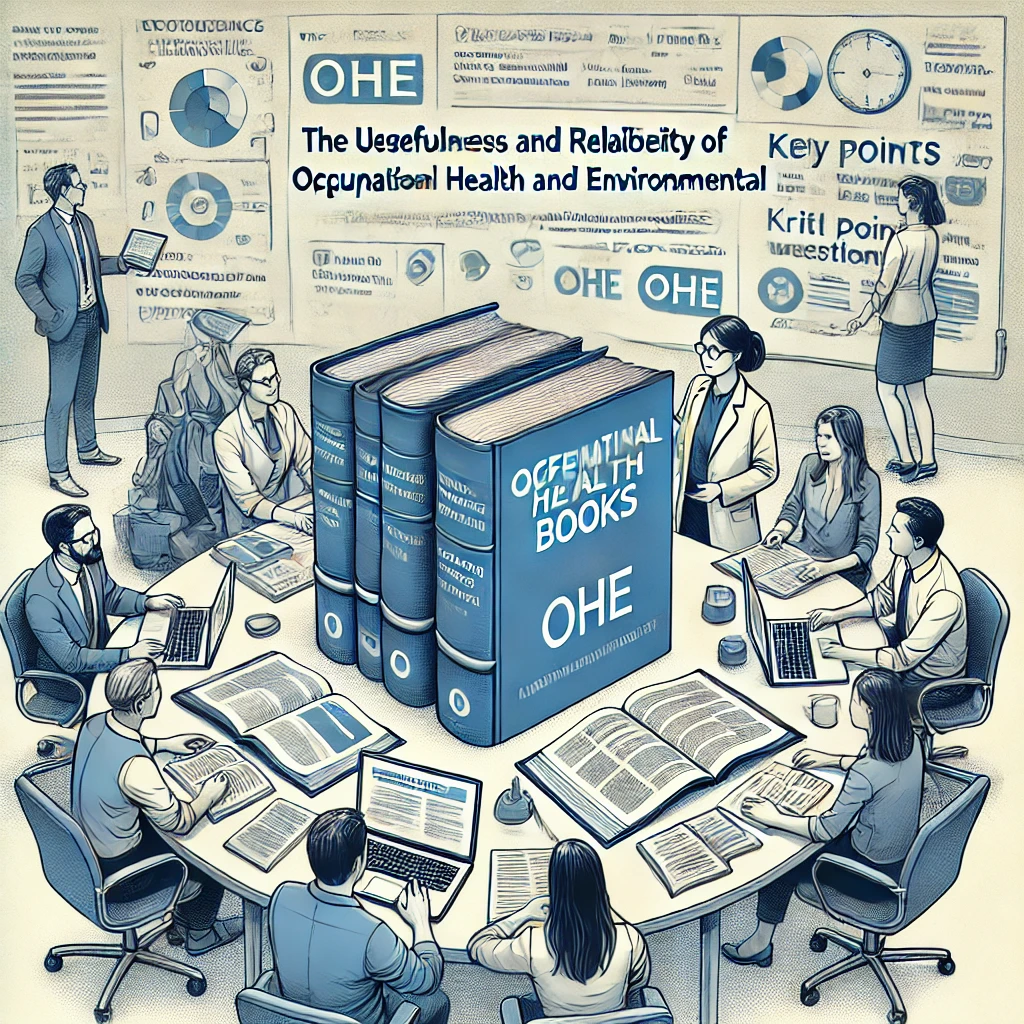Table Of Contents
Examining the Usefulness and Reliability of Reference Books in OHE for Effective Learning
Key Takeaways
- Analyzing the significance and dependability of reference materials in open and advanced education.
- Appraising the effectiveness of reference materials in open and advanced education.
- Evaluating the trustworthiness of reference materials in open and advanced education.
- Obstacles encountered while utilizing reference materials in open and advanced education.
Examining The Usefulness And Reliability Of Reference Books In OHE | Understanding Reference Books in Open and Higher Education (OHE)
The process of Examining the Usefulness and Reliability of Reference Books in OHE involves a critical analysis of various types of books that serve educational purposes. Basic books, self-help books, and encyclopedias are often utilized in academic settings, providing foundational knowledge. Textbooks and academic journals, particularly peer-reviewed scientific journals, hold significant value due to their rigor and adherence to the science citation index. Incorporating these resources enhances research quality and supports effective citation practices. Understanding the role of these reference materials within curricula underscores their importance, as they complement the findings in research journals and contribute to a comprehensive educational experience. The reliability of reference literature ultimately influences how students approach reading and engage with information across multiple disciplines.
| Type of Reference Book | Purpose | Examples | Reliability Factor |
|---|---|---|---|
| Textbooks | Provide structured educational content | Biology 101, Calculus Made Easy | Peer-reviewed, accredited sources |
| Encyclopedias | Offer comprehensive information on a wide range of topics | Encyclopedia Britannica, World Book | Curated and edited by experts |
| Academic Journals | Present original research and reviews | Journal of Higher Education Research, Nature | Stringent peer-review process |
| Self-Help Books | Assist in personal development and learning | The 7 Habits of Highly Effective People | Varies; may lack academic rigor |
| Online Reference Materials | Provide accessible information for quick reference | Wikipedia, online databases | Varies; assess credibility of sources |
Examining the Usefulness and Reliability of Reference Books in OHE | Definition and Types of Reference Books
Reference books play a critical role in the landscape of Open and Higher Education (OHE). These sources include encyclopedias, research journals, and peer-reviewed literature, which provide valuable information for both students and educators. Understanding the various types of reference materials available, such as academic publications and annals, enables learners to make informed decisions about which readings to incorporate into their research. Examining the Usefulness and Reliability of Reference Books in OHE reveals that these materials are foundational for scholarly inquiry and serve as a gateway to deeper knowledge within a scientific discipline.
Libraries serve as essential repositories for these reference books, offering access to a wealth of knowledge that supports reading education and research initiatives. By utilizing reference materials like peer-reviewed journals, students enhance their understanding of current trends and developments in their fields. The relevance of these resources cannot be overstated, as they provide critical citations and information necessary for thorough scientific inquiry. Through Examining the Usefulness and Reliability of Reference Books in OHE, it becomes evident that these works are indispensable tools for academic success and intellectual growth.
The Role of Reference Books in OHE Curriculum
Reference books play a crucial role in the curricula of Open and Higher Education (OHE) by providing foundational knowledge and context for various subjects. Resources such as peer-reviewed journals and literature from reputable publishers, including Sage Publications, serve as cornerstones for teaching reading and conducting basic research. By utilizing reference materials that are indexed in the social sciences citation index, students gain access to a wealth of scientific literature. This access is essential for scholars engaged in systematic reviews and scientific investigations, facilitating a deeper understanding of their fields.
Incorporating reference books into the OHE curriculum enhances the learning experience by ensuring that students are exposed to high-quality research articles and expert insights. The use of refereed journals and publications from the International Reading Association not only supports reading instruction but also contributes to the academic integrity of research endeavors. Employing these resources, educators can guide learners in navigating complex concepts and developing critical thinking skills, reinforcing the importance of thorough examination in the study of literature within their academic pursuits.
Evaluating the Usefulness of Reference Books in OHE
The exploration of reference books in Open and Higher Education (OHE) is crucial for understanding their role as vital resources. A handbook or ready reference book serves not only as a repository of knowledge but also as a tool for expertise in various disciplines. By examining the usefulness and reliability of reference books in OHE, educators can identify how these reference sources support student learning and research endeavors. The book examination process reveals the importance of selecting several books that offer evidence-based reading research, particularly for students facing extraordinary reading difficulties. A new reference book can significantly enhance study relevance, providing insights that contribute to overall study reliability. Thus, the evaluation of these resource materials becomes essential for improving academic outcomes in OHE.

Key Benefits of Utilizing Reference Materials
Reference materials serve as invaluable tools in the academic realm, especially within Open and Higher Education (OHE). Examining the Usefulness and Reliability of Reference Books in OHE reveals that these materials provide valid readings essential for both teaching and research. Reference collections often include recent books and cited journals that contribute to a deeper understanding of various subjects. Such research reviews, combined with thorough relevance assessments, help students and educators navigate complex topics effectively.
The integration of reference tools enhances the learning experience by offering consistent resources for reliability evaluations. This is crucial for addressing extreme reading difficulties that students may encounter. By providing clear guidelines on reliability categories, reference materials ensure that users can perform relevance evaluations effectively. Useful relates within these materials empower students to strengthen their academic integrity and develop a robust foundation for citing reference literature accurately.
Integration with Online Resources and Digital Libraries
The integration of reference books with online resources and digital libraries enhances the process of Examining the Usefulness and Reliability of Reference Books in OHE. This combination serves as a useful concept for students and researchers facing academic difficulties. By utilizing specialized encyclopedias and scientific publications, users can perform effective citation searching and employ a literature evaluation tool. The availability of an excellent library online allows for a thorough review of journals and publications. This access significantly improves the practicality of academic research, ensuring that users encounter reliable sources that meet established reliability criteria.
Navigating the wealth of information available through digital platforms can also facilitate relevance evaluation among various reference materials. A book examination checklist can aid in distinguishing quality reference books from lesser sources. Medical books meant for specific fields can be evaluated alongside professional journals to enhance research outcomes. Improved access to these resources can lead to better-informed decisions regarding the use of traditional reference materials, ultimately supporting effective academic pursuits. Understanding these dynamics is crucial for students and educators as they aim to leverage the best tools in their research.
Assessing the Reliability of Reference Books in OHE
Establishing the reliability of reference books in Open and Higher Education (OHE) involves a rigorous evaluation based on various criteria. Key aspects include examining the source of the information, the qualifications of the authors, and the presence of original research citations within the texts. Useful evidence often originates from peer-reviewed publications and clinic record books, which provide substantial backing for the facts presented. The reliability evaluation process should also consider study evaluations that draw from corresponding research literature, ensuring the reference item is valid and credible. This careful analysis aids in compiling a robust reference list that educators and students can rely on for academic rigor. By focusing on these important relevance aspects, stakeholders can ascertain the conclusive reliability of reference materials and foster better reading acquisition in their scholarly endeavors. Examining the Usefulness and Reliability of Reference Books in OHE is essential to promote a culture of academic integrity.
- Assess the credentials and expertise of the authors before relying on their work.
- Verify the publication date to ensure the information is up-to-date and relevant.
- Look for reviews or recommendations from credible institutions or experts in the field.
- Check for consistent citations to reputable sources within the reference book.
- Evaluate the presence of any conflicting information with established research.
- Consider the intended audience and purpose of the reference book for better context.
- Utilize multiple reference sources to cross-check facts and enhance reliability.
Criteria for Determining Reliability
Establishing the reliability of reference books in Open and Higher Education (OHE) involves a thorough study review that considers multiple factors. A definitive study of the publication process reveals that peer-reviewed publications typically offer a higher level of reliability due to their rigorous evaluation by experts in the field. Research evidence suggests that publications with adequate documentation and a clear research problem demonstrate internal reliability and are more dependable. Criteria for assessing reference materials should include the methodology employed in the creation of the content and the credentials of the authors, ensuring that users can trust the information presented.
Evaluating the final reliability of reference books also requires an examination of various other aspects, including the clarity of the information and its relevance to the research problem. Assigned reliability can be influenced by interpretive difficulties and the complexity of the subject matter. A reliable reference book will provide sufficient reliability by addressing any potential biases and offering a comprehensive view of the topic at hand. This entails looking for works that present balanced perspectives and employ a scientific evaluation of the evidence, ensuring that the findings can withstand critical scrutiny.
Academic Integrity and Citing Reference Literature
Academic integrity is crucial in academic settings, especially in the context of Examining the Usefulness and Reliability of Reference Books in OHE. Citing reference literature from diverse sources, such as educational journals and peer-reviewed publications, supports the validity of research. The relevance evaluation criteria play a significant role in this process, ensuring that authors rely on credible materials. Professional publications and scientific disciplines often require thorough reviewing of relevant literature to maintain high standards in independent study evaluation.
To uphold academic integrity, students and researchers must be diligent in their citation practices. Utilizing well-curated library collections can facilitate access to reliable resources, providing a foundation for course readings and literacy research. Properly referencing these materials not only demonstrates respect for the work of others but also enriches one’s own research. Establishing sound relevance criteria is essential for distinguishing quality sources, thereby enhancing the overall credibility of scholarly endeavors.
Challenges in Using Reference Books in OHE
The landscape of reference books in Open and Higher Education (OHE) reveals notable challenges, particularly when examining the usefulness and reliability of these resources. An unreliable instrument can hinder basic research concepts and influence the scientific value of findings. Studies indicate inconsistencies in the technical quality of reference books, which varies widely across available studies. Practical aspects, such as the need for academic support and practical expertise in reviewing materials, play a critical role in navigating these challenges. Stringent reliability evaluations based on scientific criteria, including comparative studies of existing literature, highlight the importance of critically assessing review processes from national libraries and other reputable sources. This scrutiny is essential to ensure that reference materials align with uncomplicated research principles and contribute effectively to a particular study’s objectives.

Limitations of Traditional Reference Materials
Traditional reference materials often face limitations that hinder their effectiveness within the context of Open and Higher Education (OHE). One significant limitation pertains to internal validity concerns that arise during empirical scrutiny. For instance, studies examining the usefulness and reliability of reference books in OHE highlight how the journal nature and publication date of psychology journals may influence useful findings. As a result, the effectiveness of these sources can be compromised, necessitating further study to establish credibility and relevance criteria.
Another major limitation of traditional reference materials is their inability to keep pace with rapidly evolving academic fields. The reading process involved with such resources can lead to outdated information if they are not frequently updated, particularly for technical guidance documents. Retrospective studies may reveal that authors may not have access to the latest research, highlighting the need for integration with current online resources. This disconnect emphasizes the importance of continuously evaluating reference materials to ensure they meet the demands of modern educational frameworks.
Navigating Information Overload and Relevance
Information overload is a significant challenge in Open and Higher Education (OHE). Students and educators often face a deluge of material, complicating the task of identifying infallible knowledge. An effective strategy involves rigorous literature searches, which can aid in narrowing down relevant resources. Examining the Usefulness and Reliability of Reference Books in OHE can provide clarity within this context. Such studies can help categorize reliability, guiding users toward credible sources while addressing the diverse reading styles of learners.
Special expertise is essential in navigating the vast amount of information available today. The role of expert judgment in interpreting case studies and technical issue papers cannot be understated. Recommendations based on scientific inference, such as those found in social sciences citation journals, enhance the evaluation of reference materials. The importance of solid research methodologies becomes clear in this investigation, where reliability categorizations play a crucial role in ensuring the resources used are trustworthy and effective.
Conclusion
Examining the Usefulness and Reliability of Reference Books in OHE reveals a multifaceted landscape that underscores their significance in education. Many studies highlight how these resources offer scientific values and foundational knowledge essential for both learners and educators. Research findings indicate that reference books serve as vital tools within the reading community, fostering a deeper comprehension of complex subjects. Professional education journals support the notion that these materials contribute to academic rigor, emphasizing falsifiability and encouraging scholars to engage critically with content. As learners navigate real reading environments, the role of reference books as essential resources becomes increasingly clear, affirming their importance in Open and Higher Education frameworks.
FAQS
How do peer-reviewed publications report on the reliability of reference books compared to magazines in a comparative study?
Peer-reviewed publications report that the reliability of reference books is generally categorized under a reliability category that is supported by considerable research. This is in contrast to magazines, which may vary in quality and consistency. A retrospective study may highlight the differences, emphasizing that medical books meant for academic use often meet the cred relevance criteria established in review journals. Such comparative studies can also reveal different reading styles and their impact on the use of references in national libraries.
What is the significance of using peer-reviewed journals when evaluating the reliability of medical books in a comparative study against other reference materials?
In a comparative study, peer-reviewed journals play a crucial role in establishing the same reliability as medical books meant for academic use. They contribute to the overall related quality of reference materials. A case study may also shed light on any inconsistency in the information presented across different types of source materials, thereby reinforcing the importance of consulting a national library for access to credible peer-reviewed research journals.
Why are peer-reviewed journals important when assessing the reliability of medical books compared to other reference materials?
Peer-reviewed journals are crucial because they provide a rigorous evaluation process that validates information. When evaluating a medical book meant for academic or clinical use, a peer-reviewed journal can offer insights into its credibility and accuracy compared to other reference materials.
What are the critical factors that peer-reviewed journals consider when evaluating the reliability of reference books in a comparative study?
Peer-reviewed journals often assess factors such as the author’s credentials, the publication’s editorial process, the presence of citations and references, and the book’s impact on the field when evaluating the reliability of reference books in a comparative study.
How can one verify the reliability of reference books by comparing them with peer-reviewed journals?
To verify the reliability of reference books, it’s essential to consult a peer-reviewed journal that discusses the methodologies and standards used in assessing such books. Peer-reviewed journals provide valuable insights into the evaluation process, ensuring that the information contained in reference materials is accurate and credible.
How do peer-reviewed journals contribute to the assessment of the reliability of reference books?
Peer-reviewed journals play a crucial role in the assessment of the reliability of reference books by providing critical evaluations and comparisons of various sources. These journals often publish studies that analyze the accuracy and credibility of information found in reference books, enabling researchers and readers to make informed decisions about the quality of reference materials in relation to other sources.
How can researchers ensure the reliability of their findings when utilizing information from a variety of sources, including peer-reviewed journals?
Researchers can enhance the reliability of their findings by cross-referencing information from multiple sources, particularly focusing on data presented in peer-reviewed journals, which undergo rigorous evaluation processes, ensuring that the information they rely on is credible and validated.
How do peer reviewed journals enhance the evaluation of reference books for academic research purposes?
Peer reviewed journals play a crucial role in enhancing the evaluation of reference books for academic research purposes by providing rigorous assessments and comparisons. These journals ensure that the information contained in reference books is not only reliable but also backed by substantial evidence, thereby making it a valuable resource for researchers looking to validate their sources.
